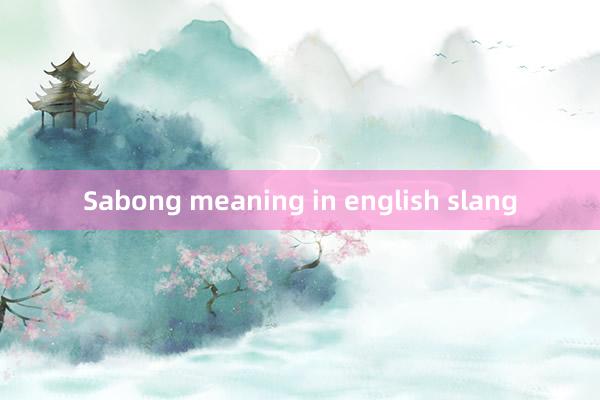
Sabong Meaning in English Slang: Unveiling the Term and Its Cultural Context
Sabong is a term that may sound unfamiliar to many outside the Philippines, but it has deep cultural roots in the country. While "sabong" literally translates to "cockfighting" in English, it also carries a broader meaning in Filipino society, especially when we explore its use in casual conversations and even slang. In this article, we’ll dive into what sabong means, its significance in Filipino culture, and how it has evolved into different contexts, including its usage in English slang.
Traditional Meaning of Sabong
At its core, sabong refers to the popular blood sport of cockfighting, which has been a long-standing tradition in the Philippines. Cockfighting involves two roosters fighting each other, often to the death, with spectators betting on the outcome. The sport is deeply rooted in Filipino history, tracing back to pre-colonial times when it was a form of entertainment and a ritual among indigenous communities. Over centuries, sabong has grown into a national pastime, with cockfighting arenas (sabungan) scattered across the country.
For many Filipinos, sabong is more than just a sport—it is an opportunity to gather with friends, family, and neighbors. Despite its controversial nature due to animal welfare concerns, sabong remains legal and regulated in the Philippines, with certain days and festivals dedicated to this activity.
Sabong in Slang and Everyday Use
Beyond its traditional meaning, the word sabong has evolved in Filipino slang and can carry more informal, metaphorical connotations. In certain contexts, sabong can be used to describe any kind of fierce competition or struggle,phcrown not just in the literal sense of cockfighting. For example, phim xet đồng tính nữ someone might refer to a heated argument or a high-stakes contest as a "sabong, phim sex móc lồn nhật bản" even if no actual roosters are involved.
In English-speaking communities, especially among Filipinos living abroad, this slang usage sometimes gets adapted. Filipinos who speak Taglish (a mix of Tagalog and English) may casually use sabong in conversations to describe intense challenges, workplace rivalries, or even competitive gaming. The term is often used humorously or to emphasize the drama and intensity of a situation.
For instance:
- "The office presentation turned into a real sabong!"
- "I felt like I was in a sabong during the debate."
Here, sabong becomes a way to amplify the feeling of competition or conflict, merging traditional Filipino culture with modern scenarios.
tải go88Sabong in the Digital Age
With the rise of digital technology and online gambling, sabong has also taken on a new form: e-sabong. E-sabong refers to the practice of cockfighting broadcasted online, where users can place bets virtually. This digital version of the sport has gained popularity, especially during the COVID-19 pandemic, when in-person gatherings were restricted.
E-sabong has sparked further debates in the Philippines, with advocates highlighting its economic benefits and opponents raising concerns about gambling addiction and ethical issues. Regardless, it showcases how the concept of sabong continues to evolve with the times, incorporating technology and reaching a wider audience beyond the traditional cockfighting rings.
The Cultural Significance of Sabong
Understanding the meaning of sabong is impossible without acknowledging its cultural weight. For many Filipinos, sabong is not just about betting or entertainment—it's tied to concepts of honor, bravery, and tradition. The roosters in a sabong match are often seen as symbols of pride, and the matches themselves are steeped in rituals and customs that have been passed down through generations.
In some rural areas, sabong events are social gatherings where community ties are strengthened. It’s a place where people bond, exchange stories, and celebrate their shared cultural heritage. While the sport has its critics, particularly from animal rights groups, its cultural significance cannot be denied.
Sabong as a Reflection of Filipino Resilience
On a deeper level, the term sabong can also be seen as a reflection of the Filipino spirit. The resilience and perseverance needed to succeed in a cockfight mirror the qualities that many Filipinos value in everyday life. Whether it’s overcoming personal challenges, facing hardships, or striving for success, the concept of sabong resonates with the determination and fighting spirit that are often associated with Filipino culture.
This fighting spirit is evident not only in cockfighting but in the way Filipinos approach life’s struggles. The slang use of sabong, especially in competitive or challenging scenarios, symbolizes a broader cultural attitude—one that embraces resilience and a never-give-up mentality.
Conclusion
The word sabong may start as a reference to a traditional blood sport, but its meaning has grown to encompass much more. In Filipino culture, it represents competition, conflict, and the tenacity to persevere. Its usage in slang—whether in Tagalog, Taglish, or even casual English—illustrates how cultural terms can evolve and adapt to modern life. Whether referring to a literal cockfight or a metaphorical battle in the workplace, sabong continues to hold a significant place in the Filipino lexicon.
Ultimately, sabong is a word rich with history, tradition, and cultural meaning. As it finds its way into English slang, it serves as a reminder of the deep connections between language, culture, and the human experience of competition and survival.
JILI slot game downloadwww.1oheya.com


